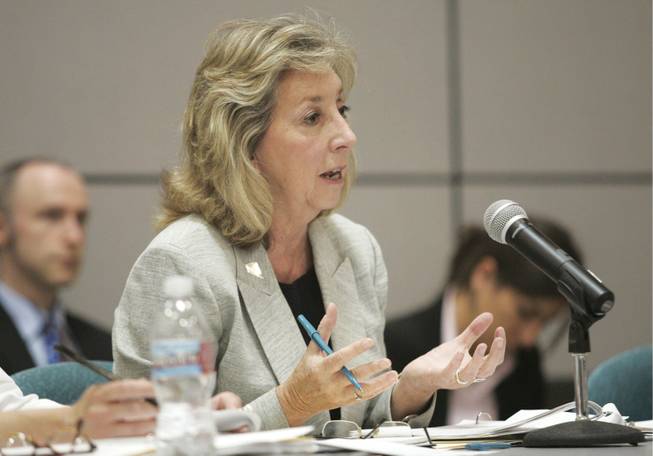
Rep. Dina Titus, D-Nev., takes part in a May 29 field hearing on the Workforce Investment Act at Nevada State College.
Friday, June 5, 2009 | 3 a.m.
Sun Archives
There’s a lot of work to be done to improve a federal program geared toward improving the country’s workforce during the economic recession.
The recession started in December 2007.
A field hearing to consider changes to the Workforce Investment Act was called at the Dawson building of Nevada State College in Henderson May 29 by Rep. Ruben Hinojosa, D-Texas, chairman of the House Education and Labor Subcommittee on Higher Education, Lifelong Learning and Competitiveness.
The act was signed into law in 1998 by President Bill Clinton, repealing the Job Training Partnership Act.
The hearing was a preparation for the act’s reauthorization and to streamline and coordinate workforce training programs. The federal government is prepared to infuse $4 billion into the workforce investment system, and it’s important, Hinojosa said, “the system is up to the challenge.”
The subcommittee is gathering information to build legislation to bring forward to the House Committee on Education and Labor in July.
Since 1998, funding for the act’s programs “couldn’t be controlled,” and 40 percent or less was going toward workforce training programs, he said. The rest, about 60 percent, was going to “subcontractors and profits,” he said.
“After 11 years, the system is long overdue for an upgrade and time is of the essence,” Hinojosa said, later adding, “In this rewrite of (the act), we need to find a way to restructure (the act’s) boards so more money can go toward training. Nevada is on the front lines of the economic crisis.”
Rep. Dina Titus, D-Nev., who took part in the field hearing, said the subcommittee is looking for innovation and best practices.
“The topic is so critical for Nevada,” she said, pointing to the increase of unemployment and forced layoffs in Nevada. Las Vegas’ jobless rate in April was 10.4 percent, a year-over-year increase of 108 percent. In April 2008 Las Vegas’ jobless rate was 5 percent.
“This Congress inherited a deep economic crisis that’s not going to turn around overnight,” she said. “Creating more jobs in Southern Nevada remains one of my top priorities.”
Workforce training programs are disjointed and put people with disabilities at a disadvantage, said Brian Patchett, CEO of Easter Seals of Southern Nevada, a nonprofit that provides job training to people with disabilities. Patchett, who is vision impaired, was one of four people who testified at the field hearing.
Others testifying spoke of the need for renewable energy job training, youth training programs and increased funding for certificate programs offered at colleges.
Training centers aren’t all equipped with technologies and services geared toward the disabled and programs that help people with disabilities transition to the workplace are too short, often leading to those employees being fired soon after their federal assistance ends, he said.
“We need to be thinking of all people together under (the act),” Patchett said.
While some emphasis during the hearing was placed on encouraging renewable energy job development, the programs that train electricians to work in the field is self-funded by workers in the electricians’ union, the International Brotherhood of Electrical Workers and the National Joint Apprenticeship and Training Program, said Chris Brooks, director of renewable energy for Bombard Electric, an installer of solar photovoltaic electric systems.
And as the economic recession continues, “we’re losing funding (and) workers can’t contribute,” he said.
The union provides certification and training to electricians, veterans and students interested in working in the renewable energy field, and is capable of training for thousands of jobs, but the funding just isn’t there, he said.
“We must continue to develop our most valuable renewable resource, the American workforce,” Brooks said.
Off-track youth also play a big part in redeveloping the country’s workforce, said Chanda Cook, director of community initiatives for the Nevada Public Education Foundation.
Nevada has the highest dropout rate and those youth who leave school early, without job training, are often unemployed, she said.
She said that Congress should look directly at the act’s youth provision, but also figure out a comprehensive strategy to improve education and career paths for those youth considered vulnerable.
“Congress should seize this moment to align outcomes, reporting and accountability, encourage and ease the use of multiple funding streams,” Cook said.


Join the Discussion:
Check this out for a full explanation of our conversion to the LiveFyre commenting system and instructions on how to sign up for an account.
Full comments policy